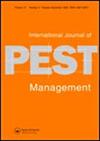农业系统木霉拮抗能力的研究
IF 1.1
4区 农林科学
Q3 ENTOMOLOGY
引用次数: 0
摘要
在过去的几十年里,乌拉圭农业系统中由作物残茬依赖病原体引起的疾病有所增加,特别是白蚁病(Pyrenophora tritrii -repentis)和油菜病(Cochliobolus sativus)。因此,我们寻找这些病原体,特别是木霉的真菌拮抗剂的存在。在土壤和作物残茬中鉴定出7种木霉。所有鉴定的菌株对这两种病原菌均有较高的体外拮抗活性。这些结果证实了木霉属存在于作物残茬和土壤中,具有抑制sativus和tritrir -repentis的潜力。管理拮抗菌群是一种有希望但不发达的策略,值得进一步研究。本文章由计算机程序翻译,如有差异,请以英文原文为准。
Characterization of the antagonistic capacity of Trichoderma spp. from agricultural systems
Abstract Diseases caused by crop residue-dependent pathogens have increased during the last decades in Uruguayan agriculture systems, in particular Pyrenophora tritici-repentis and Cochliobolus sativus. Consequently, we searched for the presence of fungal antagonists for these pathogens, particularly Trichoderma. Seven species of Trichoderma inhabiting soils and crop residues were identified. Strains of all identified species had high in vitro antagonistic activity against both pathogens. These results confirm the presence of Trichoderma spp. naturally inhabiting crop residues and soils, with potential to inhibit C. sativus and P. tritici-repentis. Managing antagonist populations is a promising and underdeveloped strategy that warrant further investigation.
求助全文
通过发布文献求助,成功后即可免费获取论文全文。
去求助
来源期刊
CiteScore
4.70
自引率
6.70%
发文量
74
审稿时长
>12 weeks
期刊介绍:
International Journal of Pest Management publishes original research papers and reviews concerned with pest management in the broad sense, covering the control of pests (invertebrates, vertebrates and weeds) and diseases of plants, fungi and their products – including biological control, varietal and cultural control, chemical controland interference methods.
The management of invasive species is of special interest. We also encourage submissions dealing with interactions of multiple pests such as arthropods and plant pathogens, pathogens and weeds or weeds and arthropods as well as those dealing with the indirect and direct effects of climate change on sustainable agricultural practices.

 求助内容:
求助内容: 应助结果提醒方式:
应助结果提醒方式:


